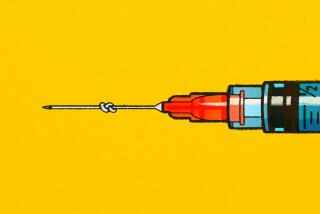When health, looks collide
Taking calculated risks with health to enhance attractiveness is as old as humanity.
Although difficult to fathom, people sometimes forgo prescription drugs that are necessary to maintain their health -- or even keep them alive.
One 43-year-old man with AIDS, for instance, recently stopped taking his drugs (Epivir, Ziagen and Viramune, among the safest of the AIDS âcocktailsâ) because they had begun causing lipoatrophy, a loss of fat tissue in the face that leads to sunken cheeks and a gaunt appearance.
The savvy, health-conscious guy who works in investment management says he has to look good to be successful.
âPeople all over the world modify their bodies in ways that are painful and sometimes dangerous, to enhance their beauty,â says Sally Engle Merry, a Wellesley College anthropologist.
Scarification, for example, is common in many cultures, even though the cutting of the skin and insertion of coloring agents are painful. Some African women wear increasing numbers of brass rods around their necks, even though this makes their necks so unstable that the rings can never be removed. In China, girlsâ feet used to be painfully bound to make them more erotic.
*
Trouble afoot
In modern America, the trade-offs may be more subtle, but theyâre no less real.
Millions of women routinely endure foot pain from pointy, high-heeled shoes. In fact, 72% of women persist at least sometimes in wearing high heels, according to the American Podiatric Medical Assn., even though high heels contribute to heel pain, the claw-like condition called hammertoes and bunions, which start out as a genetic tendency toward misaligned toes but can become worse with poorly designed shoes.
The booming plastic surgery business is another indicator of how much we value looking good and how much weâre willing to pay for it -- in money, pain and some medical risk. Last year, 6.5 million Americans had cosmetic surgery -- 5.6 million women and nearly 1 million men, according to the American Society of Plastic Surgeons. For the privilege of acquiring more fashionable noses, perkier eyelids and skinnier stomachs and thighs, Americans spent a whopping $7 billion.
And thatâs the easy stuff. The real rub, psychologically and ethically, comes with more complicated decisions such as those that involve weighing the value of attractiveness against the medical risks of using, or not using, powerful drugs.
Take steroids, for instance, and many Americans do, often to dampen overactive immune systems in diseases such as asthma and rheumatoid arthritis. Steroids like prednisone clearly work, but they cause disturbing side effects as well, including the puffy look dubbed âmoon face.â
Some people with arthritis get so upset with the way they look that they taper off steroids too quickly, says Dr. Paul Romain, a rheumatologist at Cambridge Hospital in Cambridge, Mass.
Itâs a delicate dilemma for both patients and doctors. âWhen you lose control over your appearance, you lose control over your own privacy,â he says. âYou may want to keep your illness to yourself, but when your appearance changes, you are forced to interact with other people about it.â An altered appearance can also be a constant reminder to the patient himself of his own vulnerability.
*
Everything for slimness
Weight gain is another all too visible side effect of many drugs, including those used to treat psychiatric diseases. Some anti-schizophrenia drugs such as Clozaril and Zyprexa trigger an average weight gain of 15 pounds and, sometimes, 100 pounds or more, says Dr. Donald Goff, a psychiatrist who heads the schizophrenia program at Massachusetts General Hospital.
Not surprisingly, âa lot of patients donât want to take these medications,â he says, adding that weight gain âis not just a matter of vanity -- itâs a serious threat to a personâs general health.â Yet treating schizophrenia is crucial because if left untreated, it can lead to suicide or long-term hospitalization. Fortunately, several newer drugs, including Geodon and the recently approved Abilify, do not trigger weight gain.
Drugs that cause weight gain pose an especially wrenching dilemma for young women with anorexia and bulimia who are already terrified of looking fat yet need psychiatric medication, says Dr. David Herzog, president of the Harvard Medical School Eating Disorders Center at Massachusetts General. Other patients often hesitate to take antidepressants, which sometimes cause weight gain, and some people with manic-depression (bipolar disorder) fear lithium for the same reason.
Cancer patients on chemotherapy often face the same dilemma, says Barrie Cassileth, chief of the integrative medicine service at Memorial Sloan-Kettering Cancer Center in New York. Now that there are good drugs to control nausea and vomiting, weight gain is actually viewed as an increasingly common problem, she says: âI donât know that people actually stop chemotherapy because of the weight gain, but it is devastating.â
*
A delicate balance
Dr. Cal Cohen, research director for Community Research Initiative of New England, treats the man who stopped taking his AIDS drugs because of the facial changes. Heâs supportive of the delicate balancing act between appearance and health.
The advent of better AIDS drugs in recent years has certainly been a plus, he says, yet âthere are disfiguring toxicities from some of the drugs which make people look sick.... Nobody wants to be with you if you look sick.â Cohen says that prompts some people to conclude, âIf life is just a series of toxicities, maybe Iâll take the risk because it can be so disfiguring.â
Which brings us back to the AIDS patient. Heâs been receiving monthly injections of a substance believed to boost collagen in the face. Heâs also decided to go back on his AIDS drugs for three months to âtromp the virus down,â then take another year off.
No one knows yet how his gamble will play out.






